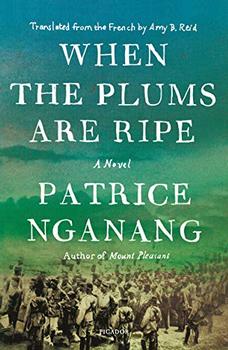Summary | Excerpt | Reviews | Beyond the Book | Readalikes | Genres & Themes | Author Bio

1
June Vacation Back in the Village
"To make a long story short," M'bangue concluded, crossing his hands on his knees, "that's how Hitler committed suicide."
Then he began to describe the deceased dictator, his blue jacket, his black tie, the barricaded toilets whose doors had to be broken down to get him out. Everyone was staring, their mouths agape, especially Pouka, who no longer recognized his father, whose hands were now tracing outrageous symbols, expansive symbols. The seer's face was lit up for an instant, then his eyes quickly disappeared into the fractals that his fingers had traced on the ground, into the geomantic mystery of the signs that gave shape to his pronouncements. No one called his word into doubt, for who could challenge his dream? Until that moment it had been nothing more than monologues, whispers, and murmurs: a spitting of distant sounds that evolved into words in the hollow of his belly.
"In the toilets," he continued, "mark my word."
No, Pouka no longer recognized his father. For everyone there, and him most of all, it was impossible to take this tale seriously. Besides, the month of June was strange enough already. Why would Hitler have committed suicide after occupying half of Europe? The Old Man didn't say—but that was the real question. Oh, his son didn't push for an answer: he just wanted to rest. The village held out that hazy promise to anyone returning from the city. Yaoundé could turn a man into a dog, as some would say. It sounded like a taunt, and this time they were right. And yet, with plum trees laden with fruit, where rows of pine and flame trees and bushes full of daisies meant it always smelled of Christmas, the village held out a promise of happiness that he could not turn down.
"He ate a good sausage," M'bangue concluded, "and then he killed himself…"
There were some who chortled. But not Pouka. No, he didn't laugh.
To think it was already 1940! Three years had gone by since he'd last set foot in Edéa; yes, three years when he hadn't come home. Maybe that's why he was staring at the Old Man's gestures with more surprise than anyone else; why he jumped at the end of the prediction. Clearly, Pouka was no longer the adolescent he'd been, torn from the shirttails of his cousin, the boxer, and sent to the mission school. It wasn't just that he'd converted to Catholicism in the meantime; no, he'd been promoted to the position of writer (really more of a secretary), écrivain-interprète! And that meant something! If reading shifting signs in the dirt was his father's business, juggling with words and filing folders was his. He, too, lived in the place where the future was created; or at least that's what he believed.
Or rather, no, that's what he hoped. How else to explain the meticulous care he took getting dressed each morning? Pouka could very well have given up on wearing his polished shoes, his tergal pants, his formal shirt, his multicolored cap, and … what else? But then he would have reverted into the barefoot little boy he'd left behind long ago. A kid. A native. Since then he had set his eyes on a goal, even if it was a little blurry. But now he'd come back. During the trip, he had come up with a reason for his visit: he told his father that he wanted a wife. Obviously that was a diversion, a way of avoiding the confrontation to come.
"I didn't send you to the white men to have you become a…"
What had he become? What? Wait a moment, dear reader, for this is a scene he had played out for himself several times. Never had he managed to say just what it was he had become. Yet it was obvious. A tall man, a head taller than anyone else. And on that head, Edéa would soon grow accustomed to seeing, come rain, come shine, a puffy cap that he never seemed to take off. Looking around, he saw respect inscribed on the faces of all the villagers. Envy, too. Jealousy, sometimes. Or maybe curiosity? Just what had he become? And they wondered: Why didn't he ever lift his cap to greet people? Did he screw with it still on his head? As for girls, no, no need to talk about girls. Still, there were a lot of stories told about him, racy stories. Stories, he knew, that worried his Old Man.
Excerpted from When the Plums Are Ripe by Patrice Nganang. Copyright © 2019 by Patrice Nganang. Excerpted by permission of Farrar, Straus & Giroux. All rights reserved. No part of this excerpt may be reproduced or reprinted without permission in writing from the publisher.
Don't join the book burners. Don't think you are going to conceal faults by concealing evidence that they ever ...
Click Here to find out who said this, as well as discovering other famous literary quotes!
Your guide toexceptional books
BookBrowse seeks out and recommends the best in contemporary fiction and nonfiction—books that not only engage and entertain but also deepen our understanding of ourselves and the world around us.